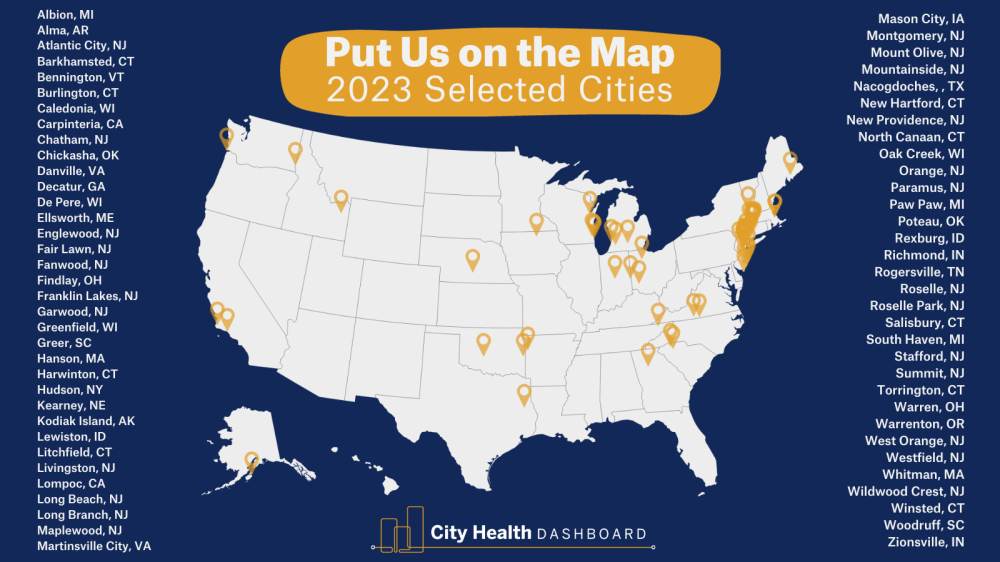Putting Small Cities on the Map to Advance Health Equity: Checking in on last year’s cities and announcing 2023 cities!
Apr. 13, 2023
Samantha Breslin
Data is powerful - it helps us illuminate challenges, informs our solutions, and improves our capacity to meet the needs of the people we serve. But data is nothing without the dedicated public servants who are doing the never-ending, often thankless, work of putting the data into action to move the needle in the right direction and drive systemic, equitable, long-lasting change.
Since launching the Put Us on the Map Challenge last year, it has been so exciting to learn how our 29 inaugural small cities – a mix of local governments, community organizations, academic institutions, and engaged citizens – have put their City Health Dashboard data to work to improve health, well-being, and equity in their communities. We are sharing and amplifying a few of these stories with the hope that this year’s winners can learn from their peers across the country and look to these as examples of what’s possible in their city.
Targeted COVID Response in Hillsborough, NJ
Hillsborough Township needed to better understand how COVID impacted their residents. They used the Dashboard’s COVID Local Risk Index, preventive services, and uninsured metrics to determine which populations they should target for COVID education, vaccine promotion, and free rapid test kit distribution and conducted extensive outreach to apartment complexes within the identified high need neighborhoods.
Becoming Nationally Accredited in Marietta, OH
As part of their application to become a nationally accredited health department, the Marietta/Belpre Health Department is in the process of implementing a Community Health Assessment and Community Health Improvement Plan (CHA/CHIP). They plan to integrate the Dashboard’s children in poverty, diabetes, high blood pressure, uninsured, and housing with potential lead risk metrics as well as racial/ethnic data to improve their understanding of community challenges and drive their implementation strategy.
Increasing Healthy Food Access in Petersburg, VA
The River Street Market (RSM) operates the city’s only farmers market. In partnership with Petersburg Healthy Options Partnerships (PHOPs), RSM has used the Dashboard’s neighborhood-level limited access to healthy foods, children in poverty, obesity, diabetes, and high blood pressure metrics to better understand community needs and supplement their locally collected qualitative data to decide which neighborhoods to place their new mobile farmers markets across the city of Petersburg.
Announcing 2023’s Selected Cities
Earlier this year, we announced the launch of the 2nd annual City Health Dashboard Put Us on the Map Challenge - an opportunity for smaller cities to make their case for why their city should be added to the Dashboard. We received a record number of competitive applications from cities across the country, with applicants representing communities with different sizes, population densities, and demographics.
We are excited to announce the 67 – yes 67! – communities we’ve selected for this year’s Challenge:

Each of these communities – ranging in population from 3,000 to 50,000 - faces unique challenges when it comes to health and has different ideas for how to drive change locally. But one common theme emerged across all of the applications, and that was the importance of having easily accessible, localized data - which many of our applicants currently lack - to help support efforts to improve health and equity for residents. In their applications, these cities described their plans to use Dashboard data for important health and well-being projects such as deploying a fleet of mobile healthcare vehicles in Caledonia, WI, creating Principles of Equity to drive education, policymaking, and health promotion in Martinsville, VA, and improving the healthcare infrastructure of a rural community in Burlington, CT.
Each selected city will receive in-kind analytic services from our talented data team and be added to the City Health Dashboard, providing new access to their city and neighborhood-level data starting in summer 2023. They will be able to use all of the site’s features including exploring metric maps, comparing metrics within their city or comparing to other Dashboard cities, viewing demographic maps, accessing Take Action resources, and more. Cities will also have access to technical assistance from the Dashboard team to help them understand and leverage the data locally as well as networking opportunities with other Put Us on the Map cities to brainstorm and collaborate on solutions. Local success stories using Dashboard data will also be featured prominently on the website in order to inspire others eager to put data to action across the country.
This is just the beginning of these smaller cities’ data journey and we look forward to working with them over the next year to build data capacity and elevate their work to advance health and equity locally.